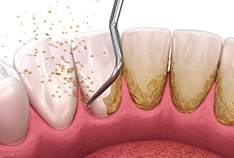


As crucial as teeth are to oral health, they aren't the only parts of your mouth that matter. Your gums also play a role in making your smile strong and healthy over time. For that reason, our practice offers quality gum disease treatment here in McMinnville! The Evans Street Dental team can help your infected gums heal and recover through this procedure. To learn more about how it works, keep reading or book a consultation today.

Per its name, gum disease is an infection of your gums – the pink mouth tissues around your teeth. It occurs when plaque builds up in your mouth from poor eating and oral care. That said, risk factors like genetics, hormones, and tobacco use can make it more likely.
Gum disease has two separate stages: gingivitis and periodontitis. During the first one, a patient will only suffer from slight gum inflammation – an irritating but minor issue. The disease’s second stage – periodontitis – is a full-blown infection that attacks jaw and gum tissue. While gingivitis is reversible with good oral care, this later form can only be managed.

Due to its two stages, gum disease can cause a wide range of symptoms. Which signs you show will depend on your infection’s severity, rate of progress, etc.
Just look at gingivitis, for example. This early form of gum disease has mild symptoms like:
In contrast, the signs of periodontitis have much bigger impacts. They include:

Dr. Ramsey will give you a thorough oral exam before performing any dental procedure. That way, she can assess your mouth and the severity of your gum disease. She’ll then use her findings to decide whether (and if so, how) to treat your gums.

Our team generally cleans your teeth and gums at checkups to ensure your smile is fresh and healthy. However, we may perform what’s called scaling and root planing if you show signs of gum disease. Through this two-stage treatment, we’ll rid your gumline of built-up plaque and smooth out the surfaces of your tooth roots. The second step is especially crucial, as it reduces the chance of bacteria accumulating in the future.

In many cases, gum disease can be reversible as long as you practice proper oral hygiene. For some people, making certain changes to their brushing and flossing routine may be sufficient to regain oral health. If the issue persists or gets worse, however, then scaling and root planing might be the next best step. Some indications that you’ll need to undergo this treatment include:

Gum disease is primarily caused by bacteria-filled plaque and tartar that has been allowed to build up on the teeth below the gum line. Scaling is a special type of cleaning that enables us to remove these harmful substances from above and below the gum line by using an ultrasonic scaler, which will stop the progression of the infection.
Then, root planing involves us gently reshaping and smoothing out the tooth roots. Why do this? This creates fewer places for plaque and tartar to accumulate in the future, lowering the risk of reinfection and stimulating the healing process. Our team will provide you with a local anesthetic before moving forward with the procedure, that way you can be comfortable and pain-free during your appointments.

Scaling and root planing are typically completed after a couple of visits. After you’ve finished your treatment, your gums should recover within a few weeks. It’s also normal to experience some mild discomfort, sensitivity, or tenderness from these procedures. To minimize your symptoms, remember to: